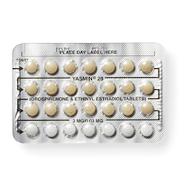Genes or birth control: What really causes blood clots?
The pill and the ring aren't the only things that can increase the risk of blood clots for some women...

Every few months, the pill and the ring hit the headlines for increasing the risk of blood clots in some women. Health care professionals know this isn’t really news—the link between certain birth control methods and increased risk of blood clots is well-established. Health care professionals also know that a bunch of other factors increase the risk for blood clots too. In addition to use of combined hormonal contraceptives like the pill, ring, or patch, things like smoking, having surgery with a cast or bed rest, obesity, and genetic factors can all increase a woman’s risk of forming a blood clot.
Until now, it’s been impossible to say how important each of these factors is on their own. The days of idle speculation are ending: A new study from Sweden compared 948 women who had blood clots to 902 who didn’t and considered each of these factors.
It depends on the progestin
The new study confirmed what other studies have shown—that the risk of a blood clot is different depending on what kind of hormonal method a woman uses.
Not all pills are created equal. Compared to women using birth control pills containing the progestin hormone levonorgestrel, women using pills containing the progestin desogestrel were over two times more likely to have a blood clot. (FYI, pills sold in the U.S. that contain desogestrel include Kariva, Mircette, Mercilon, Desogen, Ortho-Cept, Apri, Solia, Cyclessa, Velivet, and Cesia.)
No estrogen? No elevated risk. The study also showed that using most progestin-only contraception like the mini-pill, implant, and hormonal IUD was not related to blood clots.
With one important exception. The exception was the shot. Compared to women using a hormonal IUD, women using the shot were three times more likely to have a blood clot.
But genes are even more important
The study also looked at women’s DNA to see if they had any mutations related to blood disorders that cause clotting, a.k.a. thrombophilic mutations. They found that two gene mutations, Factor V Leiden and prothrombin, were strongly related to having a blood clot.
Factor V Leiden mutations: Compared to women without the Factor V mutation, those with this gene were 2.6 times more likely to have a blood clot—even when they were not using hormonal contraception of any kind. When they added a combined hormonal contraception, they became 20 times more likely to have a blood clot.
Prothrombin mutations: Compared to women without the prothrombin mutation, those with this gene were no more likely to have a blood clot than other women. However, when women with this mutation added a method of combined hormonal contraception, they became 17 times more likely to have a blood clot.
When the researchers did the same calculations without women who were obese or who had recent surgery or a cast, they found that these genetic mutations were even more strongly related to blood clots.
Genetic test? Expensive. Family history? Free.
In the U.S., between 3% and 8% of people carry at least one copy of the Factor V Leiden gene mutation, and between 1% and 2% carry the prothrombin mutation. The only way to know for sure if you have one of these genes is to get a DNA test. If you don’t have the cash for a test, nature gives us a handy alternative: family history. In another study, the same research team found that having a family member who has had blood clots was also a good way to predict who might develop blood clots when using the pill, patch, or ring.
The good news? Even women with the genes that carry the highest risk of blood clots can safely use any IUD, the implant, or the mini-pill.
How do you feel about this article?

Heat up your weekends with our best sex tips and so much more.

